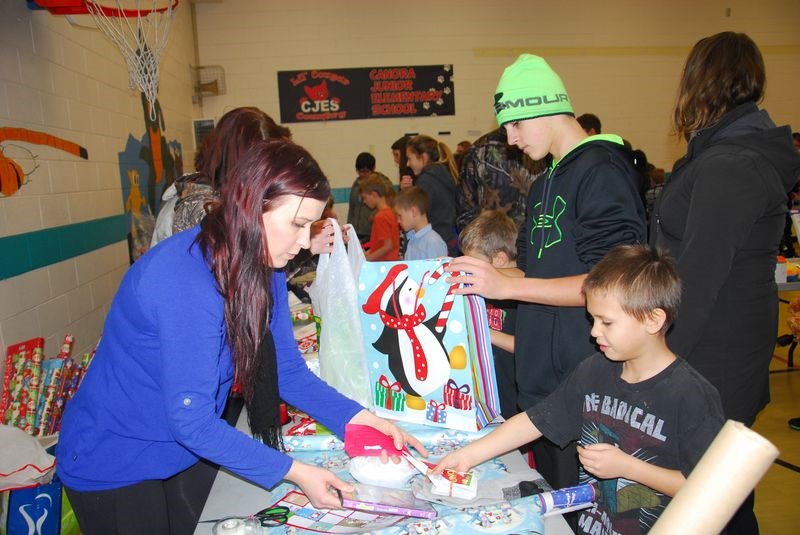Giving children the opportunity to go “shopping” by themselves for gifts for immediate family members, gets to the root of learning the joy of giving, said Betty Tomilin, who was the main organizer for the Canora Junior Elementary School (CJES) Recycled Christmas Gift Exchange on December 9.
¬Ý¬Ý¬Ý¬Ý¬Ý¬Ý¬Ý¬Ý¬Ý¬Ý¬Ý The main idea behind this pre-Christmas event, that continues to evolve over the past five years, is to give young students the opportunity to ‚Äúshop‚Äù for gifts for their siblings and parents, she said. Without this event, it is not¬Ý very common for young children to be given the responsibility of shopping for a gift for someone else.
¬Ý¬Ý¬Ý¬Ý¬Ý¬Ý¬Ý¬Ý¬Ý¬Ý¬Ý While it is referred to as shopping, students do not pay for the gift items that they select, said Tomilin.
¬Ý¬Ý¬Ý¬Ý¬Ý¬Ý¬Ý¬Ý¬Ý¬Ý¬Ý In preparation for the Recycled Christmas Gift Exchange, the family of every student is given the opportunity to donate slightly used or new toys or other gift ideas so that the tables can be stocked in the gymnasium before the shopping begins, said Tomilin. The vast majority of the students‚Äô parents participate. If someone does not want to participate, that is fine also.
¬Ý¬Ý¬Ý¬Ý¬Ý¬Ý¬Ý¬Ý¬Ý¬Ý¬Ý There have been some cases where families donated gifts, but did not want to participate in the shopping side, she said. Many families came forward with donations, and there were a few families that no longer had students in the school, but they wanted to donate.
¬Ý¬Ý¬Ý¬Ý¬Ý¬Ý¬Ý¬Ý¬Ý¬Ý¬Ý The rule of thumb is that each student would shop for a gift for each sibling and each parent, Tomilin said. Initially, the idea was to ask the student to donate as many gifts as each was going to pick up, but that stipulation no longer exists. Some bring in one or two gifts while others bring in full boxes.
¬Ý¬Ý¬Ý¬Ý¬Ý¬Ý¬Ý¬Ý¬Ý¬Ý¬Ý It has been learned over the years, that within the types of gifts that are donated there are never enough suitable gifts for fathers or teenagers, so the teachers have taken it upon themselves to utilize some school funds and purchase some gifts for these two groups, said Tomilin.
¬Ý¬Ý¬Ý¬Ý¬Ý¬Ý¬Ý¬Ý¬Ý¬Ý¬Ý On December 8, numerous members of the School Community Council, teachers and other volunteers, got together in the gymnasium and began to group the donations according to categories, such as: mother, father, brother, sister, baby and teenager. This step is actually very important, because it allows the organizers to have a better idea of what kinds of items are needed.
¬Ý¬Ý¬Ý¬Ý¬Ý¬Ý¬Ý¬Ý¬Ý¬Ý¬Ý As an organizer who has shopped to fill out the possibilities at the gift exchange, Tomilin said there are some types of gifts that are universal. She usually buys 30 to 40 boxes of chocolates and they are always used.
¬Ý¬Ý¬Ý¬Ý¬Ý¬Ý¬Ý¬Ý¬Ý¬Ý¬Ý This is a wonderful project, but one that can only work with a lot of volunteers ready to work, Tomilin said. As mentioned earlier, the volunteers began organizing the tables the previous day and to accommodate the second Kindergarten class (Kindergarten students alternate days attending school), the gift exchange actually began a little earlier.
¬Ý¬Ý¬Ý¬Ý¬Ý¬Ý¬Ý¬Ý¬Ý¬Ý¬Ý One group of volunteers that contributed immensely to this project is the high school students from grades 9 to 11, said Tomilin. Volunteered by their teachers, the high school students acted as personal shopper assistants. Before entering the gym, each student was paired with a high school student. With a teacher-approved list of who the student was shopping for, the high school assistants helped the students find possible gifts.
¬Ý¬Ý¬Ý¬Ý¬Ý¬Ý¬Ý¬Ý¬Ý¬Ý¬Ý Especially with the very young shoppers, having an assistant is very important, said Tomilin. Because shopping is new to children, many look upon the exercise as getting something for themselves. It was up to the assistants to point out that the gifts were for other members of the family.
¬Ý¬Ý¬Ý¬Ý¬Ý¬Ý¬Ý¬Ý¬Ý¬Ý¬Ý Many, many volunteers were kept very busy wrapping all the gifts on December 9. They went through rolls and rolls of wrapping paper and tape, she said. Most of the wrapping supplies were donated.
¬Ý¬Ý¬Ý¬Ý¬Ý¬Ý¬Ý¬Ý¬Ý¬Ý¬Ý The organizers do have fun, especially during the day prior to the sale, when all the donations are assessed, said Tomilin. While most donations are very average, there are a few exceptions each year. This year, some pieces of artwork were actually worth a few dollars, but they were offered alongside all the other slighty-used gifts. When it came time for the students to select gifts, the value of those art pieces didn‚Äôt mean much.
¬Ý¬Ý¬Ý¬Ý¬Ý¬Ý¬Ý¬Ý¬Ý¬Ý¬Ý After the gift exchange concluded, the volunteers went back to work packing up everything that was left over for donation to the Diabetes Society, she said.




